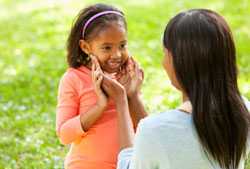Measles: Make Sure Your Child is Fully Immunized
 Measles is a highly contagious disease. It can be serious for young children. Protect your child by making sure he or she is up to date on vaccinations, including before traveling abroad.
Measles is a highly contagious disease. It can be serious for young children. Protect your child by making sure he or she is up to date on vaccinations, including before traveling abroad.
Measles is a very contagious disease caused by a virus. Measles starts with a fever. Soon after, it causes a cough, runny nose, and red eyes. Then a rash of tiny, red spots breaks out. It starts at the head and spreads to the rest of the body. Measles can be serious for young children. It can lead to pneumonia, encephalitis (swelling of the brain), and death. Measles spreads through the air when an infected person coughs or sneezes. It is so contagious that if one person has it, 90% of the people around him or her will also become infected if they are not protected.
Measles in the U.S.
From January 2 to March 25, 2017, 28 people from 10 states in the United States have been reported as having measles.
People in the United States still get measles, but it’s not very common. That’s because most people in this country are protected against measles through vaccination. However, measles is still common in other parts of the world, including many countries in Europe, Asia, the Pacific, and Africa. Every year, unvaccinated people get measles while they are abroad and bring the disease into the United States and spread it to others.
Measles can spread quickly in communities where people are not vaccinated. Children and anyone else who is not protected against measles is at risk of getting infected. That’s why it is so important to be up to date on vaccinations, including before traveling abroad.
Additional Resources for Parents and Childcare Providers
See resources for parents and others who care for children, including childcare providers.

Protect your Child with Measles Vaccine
You can protect your child against measles with a combination vaccine that provides protection against three diseases: measles, mumps, and rubella (MMR). The MMR vaccine is proven to be very safe and effective. CDC recommends that children get two doses:
- the first dose at 12 through 15 months of age, and
- the second dose before entering school at 4 through 6 years of age.
Your child’s doctor may offer the MMRV vaccine, which protects against measles, mumps, rubella, and varicella (chickenpox). MMRV vaccine is licensed for children 12 months through 12 years of age. It may be used in place of MMR vaccine if a child needs to have varicella vaccine in addition to measles, mumps, and rubella vaccines. Your child’s doctor can help you decide which vaccine to use.
Make Sure Your Child is Protected Before Traveling Abroad
People 6 months of age and older should be protected against measles before they travel abroad.
- Infants 6 months through 11 months of age should have 1 dose of measles vaccine. Infants who get 1 dose of measles vaccine before their first birthday should get 2 more doses of the vaccine (one dose at 12 through 15 months of age and another dose at least 28 days later).
- Children 12 months of age or older should have 2 doses separated by at least 28 days.
Traveling Abroad?
Before you leave for your trip, check the CDC Travel Notices on measles.
Talk with your child’s doctor to see if he or she should be vaccinated before traveling abroad.
Some teens and adults need measles vaccine too. For more information, see Measles Vaccination: Who Needs It?
Paying for Measles Vaccine
Most health insurance plans cover the cost of vaccines. But you may want to check with your health insurance provider before going to the doctor. Learn how to pay for vaccines.
If you don’t have insurance or if your insurance does not cover vaccines for your child, the Vaccines for Children Program may be able to help. This program helps families of eligible children who might not otherwise have access to vaccines. To find out if your child is eligible, visit the VFC website or ask your child’s doctor. You can also contact your state VFC coordinator.
To See If Your Child’s Vaccine Is Due
- Check your child’s vaccination record,
- Contact his or her healthcare provider, or
- Visit the immunization scheduler for newborn to 6-year-old children.
Take the Quiz
Take the measles quiz to test your knowledge. Also available as a mobile app.
More Information
- Don’t Let Measles Be Your Travel Souvenir
- To learn more about measles, MMR or MMRV vaccines, or other childhood vaccines, visit:
- Measles-related information for travelers
- Measles, Mumps and Rubella Vaccines: What You Need to Know (Vaccine Information Statement) (English or other languages)
- To learn more about the VFC program, see the Vaccines for Children Program Q&As
- The Measles and Rubella Initiative
- Información general sobre el sarampión
- Page last reviewed: April 17, 2017
- Page last updated: April 17, 2017
- Content source:
- National Center for Immunizations and Respiratory Diseases, Division of Viral Diseases
- Page maintained by: Office of the Associate Director for Communication, Digital Media Branch, Division of Public Affairs




 ShareCompartir
ShareCompartir